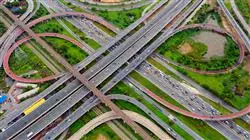University certificate
The world's largest faculty of engineering”
Introduction to the Program
Further study of the changes that new technologies will force on the infrastructure or the vehicle”

Highways are an indispensable part of the transportation network, both for people and goods. These transportation routes have been indispensable since the origins of civilization, since they encourage the progress of peoples. The global pandemic caused by COVID19 has once again highlighted the importance of roads as a means of communication for supplying the population.
The Postgraduate diploma in Road Technology has been designed to enable students to address any scenario of their future work in the field of roads. The student will be able to delve into the state-of-the-art of topics such as the connected vehicle, or the autonomous vehicle and how both are going to require changes in the competencies of the road professional. In the same way, some of the main projects under the general umbrella known as "Smart Roads" will be discussed in detail. Finally, there is a unit that breaks down technologies that are already beginning to be used in other sectors but will necessarily have a specific application on the roads of the future.
As main tools, the topics that make up each module have updated technical information, real case studies and of great interest. Always without losing sight of the digital transformation we are all undergoing and in which the world of roads is no exception.
In addition, as it is a 100% online Postgraduate diploma, it provides the student with the ease of being able to study it comfortably, wherever and whenever they want. All you need is a device with internet access to take your career one step further. A modality in accordance with the current times with all the guarantees to position the professional in a highly demanded area such as road construction.
You will learn how to approach BIM implementation in projects as well as in pre-existing infrastructures"
This Postgraduate diploma in Road Technology will make contains the most complete and up-to-date syllabus on the market. The most important features of the program include:
- Case studies presented by experts in Highway Engineering
- A deeper understanding of the management of resources for highway projects
- The graphic, schematic, and practical contents with which they are created, provide scientific and practical information on the disciplines that are essential for professional practice
- Practical exercises where self-assessment can be used to improve learning
- Its special emphasis on innovative methodologies
- Theoretical lessons, questions to the expert, debate forums on controversial topics, and individual reflection assignments
- Content that is accessible from any fixed or portable device with an Internet connection
You will be able to make a comprehensive analysis of the most current trends in society, environment and technology: connected vehicle, autonomous vehicle and Smart Roads"
The program’s teaching staff includes professionals from sector who contribute their work experience to this training program, as well as renowned specialists from leading societies and prestigious universities.
The multimedia content, developed with the latest educational technology, will provide the professional with situated and contextual learning, i.e., a simulated environment that will provide an immersive training program designed to train in real situations.
This program is designed around Problem Based Learning, whereby the professional must try to solve the different professional practice situations that arise during the academic year. For this purpose, the professional will be assisted by an innovative interactive video system created by renowned and experienced experts.
As it is an online program, you can study wherever and whenever you want. You will only need an electronic device with internet access"

A high-level program that will allow you to gain in-depth knowledge of everything related to Road Technology"
Why study at TECH?
TECH is the world’s largest online university. With an impressive catalog of more than 14,000 university programs available in 11 languages, it is positioned as a leader in employability, with a 99% job placement rate. In addition, it relies on an enormous faculty of more than 6,000 professors of the highest international renown.

Study at the world's largest online university and guarantee your professional success. The future starts at TECH”
The world’s best online university according to FORBES
The prestigious Forbes magazine, specialized in business and finance, has highlighted TECH as “the world's best online university” This is what they have recently stated in an article in their digital edition in which they echo the success story of this institution, “thanks to the academic offer it provides, the selection of its teaching staff, and an innovative learning method aimed at educating the professionals of the future”
A revolutionary study method, a cutting-edge faculty and a practical focus: the key to TECH's success.
The most complete study plans on the university scene
TECH offers the most complete study plans on the university scene, with syllabuses that cover fundamental concepts and, at the same time, the main scientific advances in their specific scientific areas. In addition, these programs are continuously being updated to guarantee students the academic vanguard and the most in-demand professional skills. In this way, the university's qualifications provide its graduates with a significant advantage to propel their careers to success.
TECH offers the most comprehensive and intensive study plans on the current university scene.
A world-class teaching staff
TECH's teaching staff is made up of more than 6,000 professors with the highest international recognition. Professors, researchers and top executives of multinational companies, including Isaiah Covington, performance coach of the Boston Celtics; Magda Romanska, principal investigator at Harvard MetaLAB; Ignacio Wistumba, chairman of the department of translational molecular pathology at MD Anderson Cancer Center; and D.W. Pine, creative director of TIME magazine, among others.
Internationally renowned experts, specialized in different branches of Health, Technology, Communication and Business, form part of the TECH faculty.
A unique learning method
TECH is the first university to use Relearning in all its programs. It is the best online learning methodology, accredited with international teaching quality certifications, provided by prestigious educational agencies. In addition, this disruptive educational model is complemented with the “Case Method”, thereby setting up a unique online teaching strategy. Innovative teaching resources are also implemented, including detailed videos, infographics and interactive summaries.
TECH combines Relearning and the Case Method in all its university programs to guarantee excellent theoretical and practical learning, studying whenever and wherever you want.
The world's largest online university
TECH is the world’s largest online university. We are the largest educational institution, with the best and widest online educational catalog, one hundred percent online and covering the vast majority of areas of knowledge. We offer a large selection of our own degrees and accredited online undergraduate and postgraduate degrees. In total, more than 14,000 university degrees, in eleven different languages, make us the largest educational largest in the world.
TECH has the world's most extensive catalog of academic and official programs, available in more than 11 languages.
Google Premier Partner
The American technology giant has awarded TECH the Google Google Premier Partner badge. This award, which is only available to 3% of the world's companies, highlights the efficient, flexible and tailored experience that this university provides to students. The recognition as a Google Premier Partner not only accredits the maximum rigor, performance and investment in TECH's digital infrastructures, but also places this university as one of the world's leading technology companies.
Google has positioned TECH in the top 3% of the world's most important technology companies by awarding it its Google Premier Partner badge.
The official online university of the NBA
TECH is the official online university of the NBA. Thanks to our agreement with the biggest league in basketball, we offer our students exclusive university programs, as well as a wide variety of educational resources focused on the business of the league and other areas of the sports industry. Each program is made up of a uniquely designed syllabus and features exceptional guest hosts: professionals with a distinguished sports background who will offer their expertise on the most relevant topics.
TECH has been selected by the NBA, the world's top basketball league, as its official online university.
The top-rated university by its students
Students have positioned TECH as the world's top-rated university on the main review websites, with a highest rating of 4.9 out of 5, obtained from more than 1,000 reviews. These results consolidate TECH as the benchmark university institution at an international level, reflecting the excellence and positive impact of its educational model.” reflecting the excellence and positive impact of its educational model.”
TECH is the world’s top-rated university by its students.
Leaders in employability
TECH has managed to become the leading university in employability. 99% of its students obtain jobs in the academic field they have studied, within one year of completing any of the university's programs. A similar number achieve immediate career enhancement. All this thanks to a study methodology that bases its effectiveness on the acquisition of practical skills, which are absolutely necessary for professional development.
99% of TECH graduates find a job within a year of completing their studies.
Postgraduate Diploma in Road Technology
.
Are you ready to drive innovation and road safety in the world of road infrastructure? With TECH Global University you can make it happen! Technology is transforming every aspect of our lives, including the way we design, build and manage our roads. In the field of road engineering, road technology plays a key role in improving road safety, transportation efficiency and reducing environmental impact. With the Postgraduate Diploma in Road Technology, you will be able to acquire the knowledge and skills necessary to apply the latest technological innovations in the design and management of road infrastructures.
Become a specialist in Intelligent Traffic Management and Road Safety
.
In this high-quality Postgraduate Diploma, you will immerse yourself in the latest technological innovations applied to road construction. You'll learn about advanced construction techniques, such as the use of smart materials, innovative paving techniques and efficient drainage systems. You will also explore the use of drones and sensors to inspect and monitor the condition of roads, which facilitates early detection of problems and proactive maintenance. You'll learn about intelligent traffic control systems, the use of cameras and sensors for traffic monitoring, and the development of apps and digital platforms to inform drivers about road conditions in real time. In addition, you will explore how technology can contribute to the reduction of traffic accidents and improve overall road safety. This Postgraduate Diploma in Road Technology will provide you with the knowledge and skills needed to lead safer, more efficient and sustainable road infrastructure projects. You will be able to apply the latest technological innovations in the design, construction and management of roads, thus contributing to improve mobility and people's quality of life. Prepare yourself to be a skilled professional in road technology and make a difference in the world of road infrastructure.







